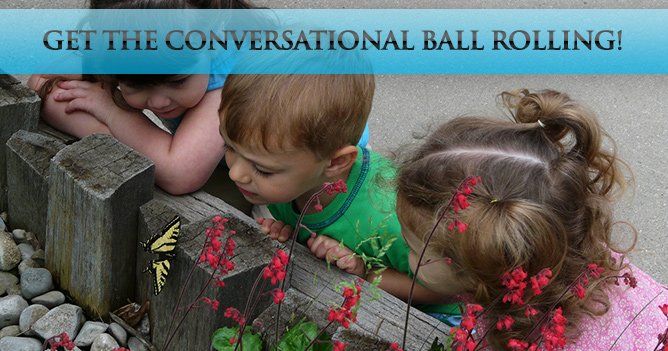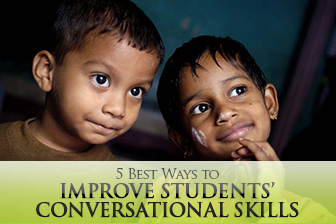The ability to hold a conversation is a vital part of the human experience.
While most children develop a conversational repertoire by listening, observing, asking questions and interacting with a variety of people, others might need a little help. Here are 5 ideas to get the conversational ball rolling!
Try These 5 Best Ways to Improve Your Students’ Conversational Skills
-
1
Conversation Starters
On small pieces of paper, write some conversation-starters and place them in a bowl. Examples might include ‘superpower you’d like to have’ and ‘favourite summer holiday’. Sneak in some more challenging topics, such as ‘where does the world come from’ or ‘why do people laugh’.
Mix the paper up and put the children into pairs. Get one child of each pair to pick one up without looking. Each pair should hold a conversation about their topic for a fixed period of time, say two minutes.
-
2
Non-verbal Signals
Watch a video clip of people talking, but with the sound turned down. Find specific points where non-verbal communication is being used and ask children to write down why they think the speaker/listener is using them. Once the children have grasped the basic ones, such as shaking or nodding the head, explain the more subtle cues to them, such as eye contact and posture.
-
3
Choosing Topics
Come up with a list of different people with varying roles – for example, a cook, a fireman, a cricket player, a farmer and an old lady. Get children to write down a list of things that they could talk about with each of them. For example, a farmer would be happy to talk about animals and the weather. Learning materials from language schools are often a good source of inspiration for this kind of method. Check out the website of ESL for examples.

-
4
Role-play
Conversation needs practice so role-play is essential. Get two more conversationally able children to talk to one another and make a note of the key parts of the conversation for discussion afterwards. The basic conversation template starts with a greeting combined with a question – such as ‘hi, how was football practice?’.
The next step is to find some common ground by picking up on key words in a response – for example, talking about football or another sport. The next stage is deeper discussion where a person shares their opinions or feelings about a subject.
Once children have grasped the concepts, get them to practice in pairs. Introduce ways to encourage the conversation, such as empathetic responses and non-verbal signals. Conversational role-play is a great skill that will stand a child in good stead for their future learning goals – whether they end up in business school or studying French language courses in Paris.
-
5
Question and Answer
The inclusion of questions in a conversation helps keep it going. Have children ask one another a question. Specify that the answer must include another question related to it. So, for example, if a child begins by asking ‘what’s your favourite colour?’, the other child might answer ‘blue. Do you like anything that’s blue?’.
Find out how you can become a BusyTeacher author.
P.S. If you enjoyed this article, please help spread it by clicking one of those sharing buttons below. And if you are interested in more, you should follow our Facebook page where we share more about creative, non-boring ways to teach English.








